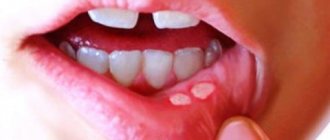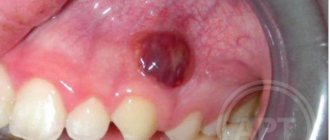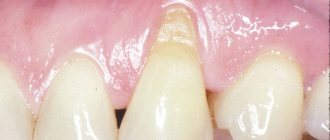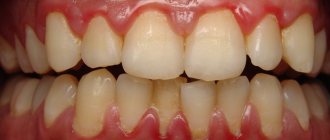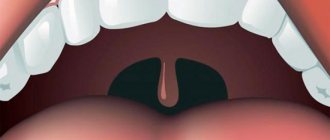Human health is a very fragile and unpredictable thing, and diseases often appear out of nowhere. This also applies to oral diseases. If you are faced with such an unpleasant problem as a sore in the mouth, then you would probably like to know how to get rid of it.
The appearance of wounds on the human oral mucosa is usually accompanied by pain and causes discomfort while eating or talking. But many people, despite these symptoms, choose not to seek help from a doctor. Some people simply ignore the problem, while others try to self-treat the disease at home. Both of these approaches give positive results only in rare cases.
The presence of any wounds and damage covering the palate indicates health problems in an adult or child. This situation should not be left to chance; you should seek help from a dentist. Only he will be able to diagnose the disease and prescribe appropriate treatment. If you are concerned about wounds in your mouth, then you can contact the LeaderStom network of dental clinics to solve this problem. We will help you cope with the situation and will make every effort to quickly cure the disease.
— 15% on the first visit
Sores in the mouth as a sign of aphthous stomatitis
Wounds in the mouth can arise as a result of the development in a person of a separate independent disease of the oral mucosa, caused by the growth and development of pathogenic microorganisms. But, in addition, the cause of such wounds may also be hidden in the general somatic condition of an adult or child.
In most cases, mouth ulcers are symptoms of a disease such as canker sores. Stomatitis is a lesion of the human oral mucosa that occurs as a result of an atypical reaction of the immune system to foreign irritants. Depending on the nature and causes of the disease, stomatitis can be of various types: ulcerative, herpetic, allergic, vesicular, etc. But people most often have to deal with the aphthous form of this disease.
Let's name the main symptoms of aphthous stomatitis:
- The appearance of round ulcers (ulcers) in a person’s mouth, which are grayish in color and surrounded by a red, inflamed rim. Ulcers are located either separately or in groups and have different sizes.
- Painful sensations in the affected areas of the upper and lower palate of a person that occur during eating, drinking, or talking.
- Deterioration of a person’s general well-being, weakness.
- Temperature increase. But this is not a mandatory symptom; it occurs in most cases in children, since they are more difficult to tolerate aphthous stomatitis in the oral cavity.
- Enlarged submandibular lymph nodes. This symptom of aphthous stomatitis also occurs more often in children than in adults.
Sore tongue in children
In most cases, neoplasms on the tongue in children are fungal, which are called thrush. This pathology occurs as a result of insufficient oral hygiene in a child.
In this case, the tongue becomes dry, colored bright scarlet. Initially, whitish tubercles form on it. As thrush progresses, they turn into a film that “covers” the entire tongue completely. It can be removed quite easily. In this case, small erosions may form on the organ.
Why does aphthous stomatitis occur?
As noted above, the causes of aphthous wounds in a person’s mouth can be both local and general somatic in nature. Let's look at the main ones.
Local causes of aphthous stomatitis:
- Mechanical damage to the human oral mucosa. Such injuries occur as a result of a person eating hard and tough foods. Often, even a small scratch on the roof of the mouth can cause aphthous stomatitis.
- Thermal lesions of the human oral mucosa. The occurrence of wounds and the development of aphthous stomatitis in this case provoke burns of the mucous membrane, which a person could receive by consuming hot drinks or food.
General somatic causes of wounds in the human oral cavity:
- Heredity factors. The predisposition to the occurrence of aphthous stomatitis in the mouth may be determined by genetic reasons. Therefore, there is a risk of developing this disease and the manifestation of a chronic form of stomatitis (when ulcers on the mucous membrane appear regularly) in people whose parents also suffered from this disease.
- Somatic diseases. Aphthous stomatitis often develops in people who suffer from any secondary somatic diseases. For example, these could be diseases of the digestive system and gastrointestinal tract.
- Weak immunity. For this reason, children are susceptible to oral ulcers because their immunity is not yet fully developed. In a child, aphthous stomatitis is more severe than in an adult and is accompanied by an increase in temperature and a deterioration in general well-being. Against the background of colds, immunity is also often reduced, and aphthous stomatitis occurs in the person’s mouth.
- Avitaminosis. With an incorrect diet, a person does not receive enough substances necessary for the successful functioning of the body. Due to a lack of vitamins C and B or microelements such as selenium, folic acid, zinc or iron, in some cases aphthous stomatitis occurs in a person’s mouth.
- Allergy. An allergic reaction associated with eating foods such as citrus fruits, nuts (especially peanuts), chocolate, red berries (strawberries, wild strawberries) or foods containing gluten (cereals, pasta) in some cases leads to the appearance of canker sores. wound in a person's mouth.
- Stress. When a person finds himself in a stressful situation, he spends significant resources to cope with the current problem. This leads to a loss of strength, decreased immunity and a general weakening of the body, as a result of which wounds form in the person’s mouth and he develops aphthous stomatitis.
Is stomatitis contagious?
Stomatitis on the tongue itself, as a disease, is not contagious. Infections that provoke its appearance are contagious, including the herpes virus and the human RNA virus, which causes vesicular stomatitis.
In cases of such a disease, a sick person should use separate utensils, hygiene products and personal supplies. These items are disinfected or treated with boiling water after use.
Only an experienced doctor can determine the type of stomatitis and the cause that provoked the appearance of ulcers in the mouth and tongue of a person. Based on the results of the examination and diagnosis, a treatment plan for the disease is drawn up and appropriate remedies are selected.
How to get rid of sores in the mouth?
Stomatitis wounds that occur in the human mouth, in most cases, heal on their own within 7-10 days after formation. But timely treatment of aphthous stomatitis is necessary in order to prevent the formation of ulcers on the human oral mucosa again. The fact is that the acute form of stomatitis, which is characterized by the sudden appearance of wounds of various sizes on the upper and lower palate in a person’s mouth, if the problem is ignored or the wrong treatment is carried out, tends to develop into a chronic form of the disease. Wounds in the oral cavity with chronic stomatitis appear periodically and bother a person from time to time throughout life.
To exclude the possibility of aphthous stomatitis ulcers reoccurring, dentists perform the following treatment:
Local therapy
. It involves treating wounds on the oral mucosa with antiseptic agents: gels, ointments or sprays. During this treatment of stomatitis, a person is prescribed daily rinses with solutions such as furatsilin, chlorhexidine, miramistin, etc.
General therapy.
It includes a set of measures to cure this disease and at the same time strengthen the body. To strengthen the body, the doctor prescribes immunomodulatory drugs and vitamin courses to the person. To combat aphthous stomatitis, different drugs are used, depending on the nature of the disease and the causes of its occurrence: antihistamines, antivirals, steroids or antibiotics.
The selection of funds for the treatment of wounds with aphthous stomatitis is carried out only by a doctor and occurs after a visual examination of the person’s oral cavity, conducting the necessary diagnostic tests and making a diagnosis. The LeaderStom Clinic offers to use the services of our experienced doctors to carry out these operations.
Medicines to treat pain
If wounds occur on the tongue, the following are prescribed:
- Antiseptic drugs that help fight microbes and also reduce the sensitivity of the mucous membrane due to analgesic components. Similar medications include: Hexoral, Ingalipt, Strepsils.
- Disinfecting medications (alcohol, brilliant green, iodine, hydrogen peroxide). The listed medications must be used very carefully in order to avoid burns to the mucous membrane. To treat the wound, you need to moisten a cotton swab in the healing composition and apply it pointwise to the affected area.
- Dental gels.
These products also disinfect and anesthetize wounds. These include: Kamistad, Metrogyl, Cholisal, Solcoseryl.
We recommend watching a video about treating sores in the mouth:
In addition, it is recommended to rinse the mouth with sea water. To make such a medicine, you need to combine water with salt, iodine and soda. This procedure can also be carried out using a solution of Furacilin, Chlorhexidine, Chlorophyllipt, and propolis tincture.
What can be done to prevent sores in the mouth from appearing again?
Completing a course of timely treatment for aphthous stomatitis will reduce the risk of a similar disease of the human oral mucosa in the future, but in some cases it will not completely eliminate this possibility. This especially applies to situations where a person has a hereditary tendency to develop aphthous sores in the mouth, suffers from autoimmune diseases, and is prone to allergies.
In such cases, preventive measures are required:
- Enhanced oral hygiene. It involves not only daily brushing of a person’s teeth and gums twice a day, but also rinsing the oral mucosa with solutions of antiseptics or medicinal herbs in order to prevent stomatitis.
- Balanced diet. Reviewing the diet and diet will help saturate the human body with essential vitamins and microelements and reduce the risk of allergies that can cause aphthous wounds in the human mouth.
- Taking vitamin complexes. If it is not possible to compensate for the lack of nutrients in the body with nutrition, then to prevent stomatitis a person can regularly take vitamin complexes, the composition of which, doses and duration of administration will be determined by your attending physician, based on the results of the tests.
- Taking immunomodulatory drugs. Today, there are many remedies that stimulate the immune system and encourage the body to resist diseases. They can be either of plant origin or synthesized in the laboratory. The selection of such drugs is individual for each person and is carried out by a doctor.
- Compliance with preventive measures, timely treatment of the disease and following the recommendations of the attending physician will help a person avoid relapses of aphthous stomatitis and the reappearance of wounds in the mouth in the future. Be attentive to yourself and your health, listen to the signals that your body gives, and at the first signs of disease in the oral mucosa, seek help from a dentist.
You should not self-medicate stomatitis and use the advice of friends or information found on the Internet, since the exact cause of sores in the mouth and stomatitis can only be identified through diagnostic methods. And the selection of treatment is determined in accordance with the diagnosis, and in each case it is individual. Dentistry "LeaderStom" offers its assistance in the treatment of aphthous stomatitis and other diseases of the oral mucosa. Contact us and we will help you identify the cause of the disease and select medications accordingly.
Diagnostics
To make a correct diagnosis, patients must undergo modern diagnostic methods in dentistry. In addition, the doctor interviews the patient and examines the oral cavity. Research includes:
- Staining with special dyes allows you to clearly visualize the damage.
- Laboratory tests of cytological type.
- Histological studies of cells.
- Biochemical tests.
- Immunological and microbiological examinations.
- Diagnosis of allergies.
If the situation is complex, the patient may be referred to other specialists for consultation. The dentist will determine the stage of the disease, find out its causes and nature, and draw up a symptomatic picture. If necessary, the patient is examined by a pulmonologist and a neurologist. After their consultation, the list of instrumental and laboratory activities can be supplemented.
Aphthae of traumatic nature
Ulcers resulting from trauma include:
- Afty Bednar. Happens only to small children. They are traumatic ulcerations. They arise due to the habit of constantly gnawing hard objects, poor hygiene, and gross mechanical irritation of the upper palate. Usually such white areas are covered with a yellowish coating, which can be easily removed.
- Traumatic aphthae. These include ulcers formed due to sudden movements with a toothbrush, carelessly performed dental treatment, rubbing of dentures, exposure to acids, alkalis, and medications. Treatment of such neoplasms does not take much time and is not complicated. The main thing here is to remove the influence of the provoking factor, then the tissues will recover fairly quickly.
Content:
- How do they manifest themselves?
- Where do they come from?
- Consequence of dental diseases
- Aphthae of traumatic nature
- Result of common diseases
- How to cure
Defects of the mucous membranes of the oral cavity are not uncommon.
Many people encounter them. They can occur due to infectious and viral diseases, mechanical damage to tissues. Most often, dentists encounter white sores on the gums. These are painful areas that prevent the patient from enjoying life. They make eating problematic and do not allow for high-quality hygiene measures. Any touch to the affected area provokes acute pain.
It is important not to ignore the presence of white patches on the gums. If they appear, you should contact your dentist. The doctor will determine the cause of the disease and tell you how to eliminate it.
Where do they come from?
Conventionally, all provoking factors can be divided into the following groups:
- mechanical or thermal damage to tissues;
- dental diseases;
- systemic pathologies.
In other words, the problem may be much more serious than it seems at first glance.
How to cure
Treatment for damage to the mucous membranes is always selected individually. There is no single regimen that is suitable for every clinical situation. First, the doctor determines the cause of the complication, and only then tells how it can be eliminated. The emphasis is on the area of the affected surface and the features of its localization, the presence of concomitant diseases, and the severity of symptoms.
To stimulate local regenerative processes the following can be used:
- topical agents - gels, solutions, creams, ointments;
- medications administered orally, intravenously or intramuscularly (broad-spectrum antibiotics, painkillers, immunostimulants, anti-inflammatory drugs, vitamins);
- physiotherapy.
In some cases, it is necessary to carry out professional hygiene, treat identified dental diseases, and replace old prosthetic systems with new ones. If necrotic tissue needs to be removed, the doctor uses anesthetics. They make the intervention painless.
It is very important that a person does not ignore painful areas on the gums. If they appear and do not go away within three to five days, you should definitely consult a dentist. After all, it is possible that the disorder is not associated with stomatitis, but with some serious pathology of the internal organs. In any case, you won’t be able to find out at home.
Of course, it is easier to prevent the development of a dental disorder than to treat it. Preventive measures to prevent the occurrence of erosion on the gums come down to following the rules of hygiene, undergoing specialized dental examinations, timely treatment of all diseases, and proper nutrition. People who care about their health encounter gum ulcers much less frequently.
